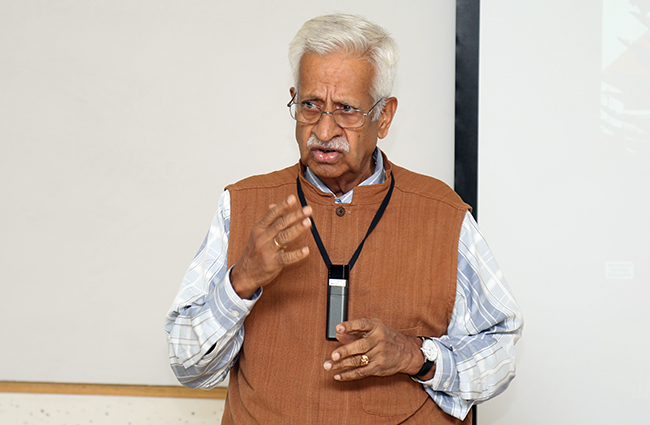25 July, 2018: “In this modern century, science and technology policies must include people, skills and knowledge. Innovative policies alone can enhance the country’s net comprehensive national development,” said Prof. V.S. Ramamurthy, nuclear scientist and Padma Bhushan awardee, at an talk hosted by the Post Graduate Programme in Public Policy and Management (PGPPM) at IIMB.

Prof. V.S. Ramamurthy at IIMB
Describing the 20th century as the “century of discoveries”, he placed emphasis on the role of the science and technology enterprise model for national security and economic development. “USA, Japan, Korea and Israel are investing heavily in research and development; where does India stand?” he asked.
Offering an overview of the evolution of public policy in India, Prof. Ramamurthy spoke of the challenges unique to the country. “Though India’s Science & Technology Public Policy has not been able to keep pace with our population and economic growth, India has always been a contributor to global scientific knowledge. Even though external invasions and colonial rule certainly disrupted our skill chains, curiosity-driven research has always remained alive,” he said, naming contributions to the development of modern physics by J C Bose, C V Raman, S N Bose, and M N Saha.
Pointing out the emphasis on global competitiveness, quality and price, he explained the difference between the Science & Technology policies in 2003 and the Science, Technology & Innovation policies in 2013, where the focus was on the need for India to excel in innovation.
Remarking that technology was no longer the luxury of the rich today, he said innovation and entrepreneurship are creating opportunities and shrinking time from mind to market place, leaving policy makers little time to understand long-term public risks, including societal impacts. “Managing public perception is a challenge,” he added.
Inviting questions from the audience, Prof. Ramamurthy touched upon topics like migration of Indian students to foreign countries, the phenomenon of ‘brain drain’, government’s role in the present education system, where India stands in terms of public policies, and the CSIR lab’s progress in the development of public policies and more.
